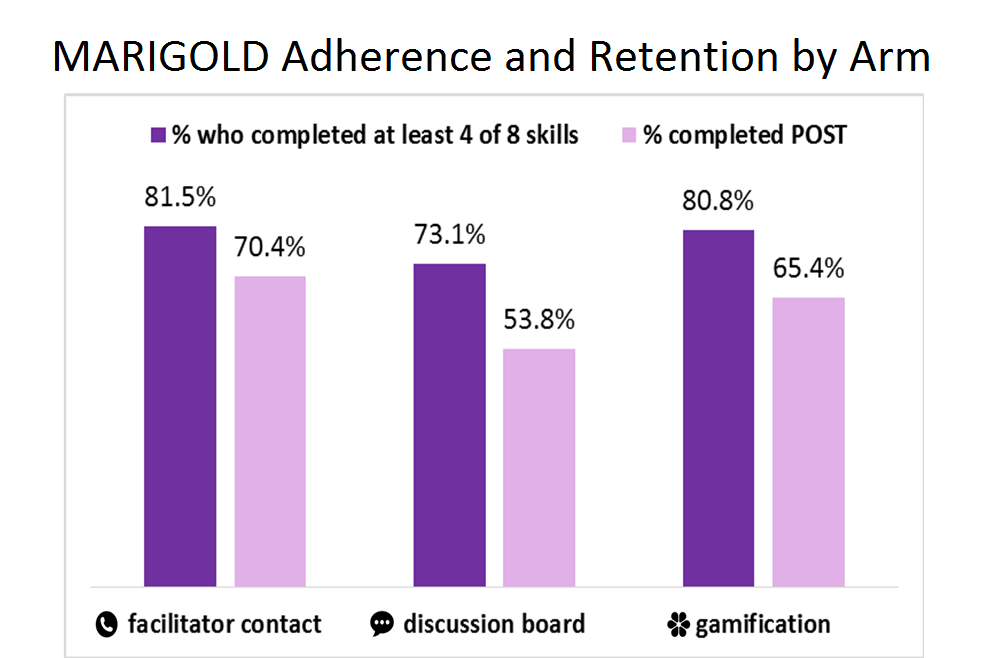Presenting Author:
Eva Shiu, M.P.H.
Principal Investigator:
Judith Moskowitz, Ph.D.
Department:
Medical Social Sciences
Keywords:
positive emotion, online interventions, depression, positive psychology
Location:
Third Floor, Feinberg Pavilion, Northwestern Memorial Hospital
PH11 - Public Health & Social Sciences
MARIGOLD Online Intervention for Elevated Depression: Adherence/Retention and Preliminary Efficacy
Although online delivery of interventions has great promise for reaching a broad audience, retention is often sub-optimal. In the present study, we tested 3 enhancements to our online positive emotion intervention for increasing adherence & retention. MARIGOLD is a 7-week online intervention that teaches 8 positive emotion skills for individuals with elevated depression symptoms on the PHQ (Kroenke, 2001). The MARIGOLD skills are: 1) Noticing Positive Events 2) Amplifying Positive Events 3) Gratitude 4) Activation 5) Mindfulness 6) Positive Reappraisal 7) Strengths and 8) Acts of Kindness. In this preliminary phase, 79 participants were recruited online and randomized into 3 arms with the intervention plus 1 of 3 enhancements designed to increase adherence and retention: weekly brief facilitator contact (FC), online discussion board (ODB), or gamification. Consenting participants received questionnaires at baseline, immediately post intervention (POST), 1 month post intervention and 3 months post intervention. We assessed the following outcomes: depressive symptoms (PHQ; Kroenke, 2001), depressive mood (CESD; Radloff, 1977) perceived stress (PSS; Cohen, 1983), positive and negative emotion (DES; Fredrickson, 2003), positive skills usage, and mindfulness (FFMQ; Baer, 2006). Retention was based on completing the baseline & POST assessments. Adherence was based on accessing at least 4 of 8 skills. Preliminary results show promising adherence & retention, with over 60% retention through the post-intervention period compared to the 50% norm in online interventions. For enhancement arms, FC showed the greatest retention (70% completed POST) and both FC & gamification were conducive to adherence (81.5% & 80.8%, respectively). We used longitudinal mixed modeling to assess MARIGOLD’s efficacy on psychological adjustment over time and differences in efficacy by enhancement arm. Since the study is ongoing, our preliminary efficacy analyses focused only on assessments from baseline to POST. Within this timeframe, participants across all three arms showed significant reductions in depression (ps<.001), negative emotion (ps<.002), and perceived stress (ps<.03). Significant increases in positive skill usage (ps<.02) and mindfulness (ps<.01) were also shown across all three arms. Interestingly, two arms (ODB & gamification) showed improvements in positive emotion (ps<.08), meaning and purpose (ps<.02), and reductions in depressive mood (CESD) (ps<.003), whereas the FC arm did not show improvements on these outcomes over time (all ps>.17). The current pilot study provided preliminary evidence demonstrating both the feasibility & preliminary efficacy of an online positive emotion skills intervention for people with elevated depression. This trial is the precursor to a full-factorial design, recruiting 600 participants into 9 research arms with a combination of enhancements and an emotion-reporting only control condition.


